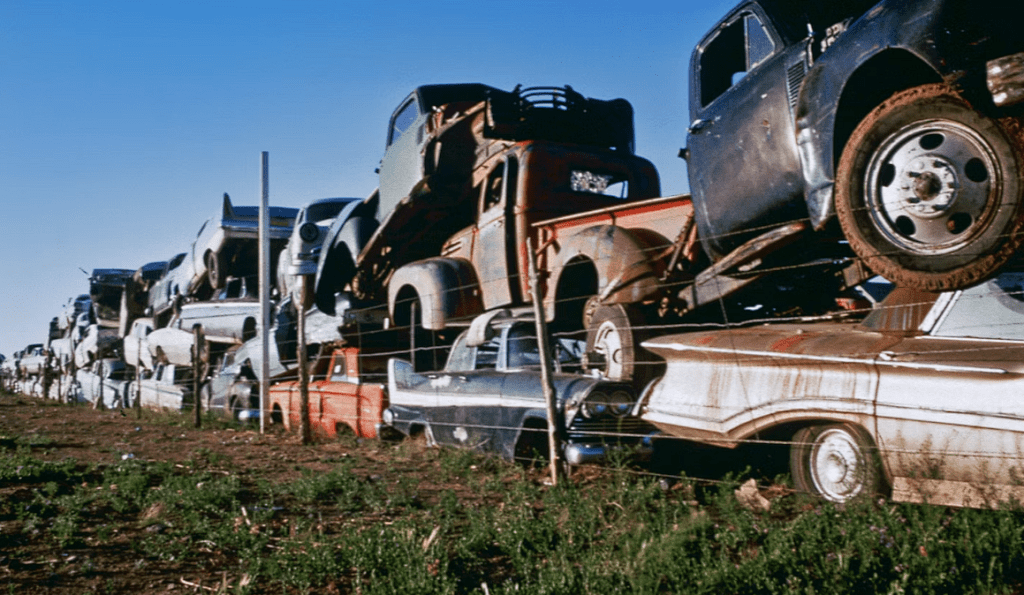You can either scrap your old car or trade it for a newer, more practical model. Both have pros and cons; the one you should choose depends on your particular needs and the condition and age of your vehicle.
To help you decide what to do with your old car, this article compares and contrasts the two options of scrapping and trading it. We provide safe and environmentally friendly car removal services for your unwanted vehicle.
In addition, this article will provide helpful insights to help you decide which option is best for you, whether you're looking to make some extra money or want to get rid of a car that's taking up space.

What Is Scrapping A Car?
To "scrap" a car means to sell it to a junkyard or scrap yard to be dismantled and sold for parts. In most cases, after removing the car's valuables, the body is crushed, and the metal is recycled. Unfortunately, cars in bad shape are no longer safe to drive, would cost too much to fix, and are often scrapped as a last resort.
Reasons To Scrap A Car
There are a lot of situations in which getting rid of a car is the best option. Of course, it's up to you to decide if you still need or want to keep your car, but here are some of the most common ones:
Without Selling, You Want To Get Rid Of It.
It's a pain to sell a car since you have to clean it up, contact dealers, set up test drives, take pictures, post it online, and negotiate with individual purchasers. You might not have the time or stamina to put into this. So instead, click a few buttons (see the "how to scrap your car" section for details), and your car could be picked up and hauled away the next day for scrapping or salvage.
Repairs Are More Expensive Than The Car.
Consider sending your car to be scrapped if its value has increased as a non-runner. A common problem for car owners is that the longer they keep a given vehicle, the more money they end up spending on maintenance and repairs, often exceeding the vehicle's depreciated value. Scrapping your car is a great choice when you reach that point because you can still earn money from it.
It Is Not Worth Enough To Sell.
You may need more for your car to make a private sale worthwhile, even if you have the time and patience to arrange it. For example, it may be more cost-effective and convenient to have your car scrapped if it is old, damaged, or in need of extensive repairs.
Your Vehicle Is Not Fuel Efficient.
When fuel prices are high, driving a car that doesn't get good gas mileage is more costly. Many people have found themselves financially bound because of spending excessive money on gas for their inefficient vehicles. You won't be able to sell your old car in its current condition due to the rising popularity of electric and hybrid vehicles and the improved fuel economy of modern vehicles.
You Want To Get Rid Of It Quickly And Easily.
You can use Car Scrap to quickly and easily compare prices from over 120 buyers once you've decided to sell your car for scrap. Then, we'll give you an instant quote for your car's value and arrange free pick-up, all within 30 seconds. After making your choice, the car will be ready for pickup at your convenience.
Your Vehicle Has Been Written Off.
If your car has been deemed a total loss, it is highly likely that it is either damaged beyond repair or would cost too much to fix.
Pros Of Scrapping A Car
You might be wondering if scrapping your old car is the best option for getting rid of it. Even though there are other options for getting rid of the car, like selling it or giving it away, scrapping it can have some advantages.
The following is a list of some of the benefits of scrapping an old car:
- Safe disposal of hazardous materials - The improper disposal of car parts potentially harmful to the environment includes lead-acid batteries, mercury switches, and airbags. You can rest easy knowing that when you scrap your car, all of these harmful components will be removed and disposed of in an eco-friendly manner.
- Environmental benefits - Scrapping a car has a higher recycling rate than keeping it on the road, making it a greener choice. This not only reduces landfill waste but also conserves natural resources by reusing materials.
- Cash for your car - You can get extra money by trading in your old vehicle at one of the many scrap yards that pay cash for cars. You can get money for an old or unwanted car this way, though how much you get will depend on its condition and market value.
Cons Of Scrapping A Car
Although there are a number of advantages to junking a car, there are also some potential disadvantages that should be taken into consideration.
The following is a list of some of the cons of scrapping a car:
- Inconvenience -Scraping a car's only sometimes convenient because of the time and effort required to search for a scrap yard, bring the vehicle there and complete the proper documentation. There might be better choices than scrapping the vehicle if you are pressed for time or lack a suitable means of transporting it.
- Lower value than selling - It's usually more profitable to sell a car than scrap it, especially if it's in decent shape. Selling your car would be the best way to maximise your profit.
- Emotional attachment - It can be tough to decide to junk a car that has sentimental value to its owner. You should sell or donate your car if you have strong feelings about it.
- Potential for scams - Some scrap yards may try to take advantage of you by offering a low price for your vehicle or tack on unexpected costs. Do your homework and pick a scrap yard with good reviews to avoid getting ripped off.
What Is A Trade-In?
To "trade in" a vehicle means bringing it to a dealership in exchange for a credit that can be applied to purchasing a new vehicle. The trade-in value of your current vehicle will be subtracted from the purchase price of your new vehicle at the dealership.
If you want to upgrade to a more modern vehicle but want to avoid the hassle of selling your old car first, this might be a good option for you to consider.
Reasons To Trade In A Car
Holding on to a car you don't use, can't afford, or would rather not have right now is not the best idea. It's as good a time as any to make a trade now. Examining the Reasons Why
Changes In Lifestyle
Getting around in a two-seat sports coupe was great when you were single, but now that you're a family with a newborn, a toddler, and the family dog, it may be a real pain. When you care about the welfare of others, your safety becomes an even higher priority. When you have a family to support, you may find yourself on a strict budget, making it difficult to justify the purchase of a second car. Changing from a compact car to a more practical vehicle like a minivan, sedan, station wagon, or SUV is a logical choice.
The Value Of A Vehicle Is High.
Since new cars are in short supply, the price of used ones has risen sharply. This is largely due to the worldwide shortage of chips. However, dealers' inventory levels are low, so they'll jump at the chance to add your used vehicle.
Unreliability
A vehicle that is frequently in need of repairs is, at best, an annoyance. Your ability to make a living is at risk, and you could even be in danger if your vehicle breaks down on a crowded highway. If you're spending a fortune on repairs, it's because you have to take the car in for maintenance on a regular basis. If the rising cost of repairs is going to exceed the vehicle's worth, it may be more financially prudent to trade it in for a more dependable model.
High Mileage
Preventative maintenance measures may include trading a vehicle with high mileage for a newer model. The automotive website Edmunds.com reports that between the 90,000 and 120,000-mile mark, more costly repair issues, such as typically beginning to crop up and faulty timing belts, can be a good opportunity to think about making a change. But, unfortunately, when the time comes to make a trade, you'll get less money for the car because of depreciation and the higher likelihood of expensive repairs.

Pros Of A Trade-In
If you're in the market for a new car but still have an old vehicle, trading it in for store credit that can be applied to purchasing a new car is a simple and convenient way to save money.
The following are some of the pros of making a trade-in:
- Convenience - Trading in your vehicle eliminates the hassle of selling it yourself, including advertising, haggling, and paperwork. All of that will be taken care of for you by the dealership.
- Quick process - A private sale of your vehicle can take weeks or months, but a trade-in can be finalised in a few short hours. This expedites the time you can take possession of your new car.
- Lower tax bill - The amount of the trade-in allowance reduces the price of a new vehicle. You could save significant money on sales tax if you do this.
- No showings or advertising - You can avoid the hassle of selling your car privately, fielding unsolicited offers, and interacting with strangers by trading it in instead. People who don't want to go through the trouble of selling a car privately may find this a welcome development.
- A lower down payment - Making a smaller down payment on a new car is possible when you trade in your old one. The amount you need to finance will go down after the trade value is subtracted from the total price of the new vehicle.
Cons Of A Trade-In
Although trading in your car might seem like the most convenient option, there are a few potential drawbacks that you should be aware of first.
The following is a list of some of the drawbacks of doing a trade-in:
- Negotiating is limited - By trading in your vehicle, you give the car dealer carte blanche to determine the selling price. This means you may need more time than expected to negotiate a fair price for your car.
- Emotional attachment - Trading in a car with sentimental value to you can be tough. Donating or selling your car privately may be preferable if you have strong feelings for the vehicle.
- Selling privately has a lower value - The trade-in value offered by dealerships is typically lower than the value you could achieve by selling the vehicle privately. Selling your car privately could net you more money than selling it to a dealership.
- Condition requirements - It's possible that car dealerships will only accept vehicles in good condition as trade-ins. You might be unable to trade in your vehicle if it has sustained substantial damage or major technical problems.
- Possible hidden costs - Some car dealerships may offer you a low price for the vehicle you want to trade in, but then they will tack on additional fees or charges to the total cost of the new vehicle you want to buy. Read everything carefully, especially the fine print, and try to negotiate the best deal possible.
Conclusion
This article compares and contrasts the two choices for getting rid of an old car: scrapping it or trading it in for a newer, more useful model. When a vehicle is "scrapped," it is sold to a scrap yard where it will be dismantled and the parts sold separately. Some people choose to trash their vehicles because they don't want to deal with the hassle of selling or fixing them, while others just don't have the time or resources to do so. It's cheaper to buy a new car than pay for the repairs. When a car is too old, too damaged, or needs too many repairs, scrapping it is a good choice.
Using car scrap, which provides instant quotations and free pick-up, might be faster, easier, and more convenient than selling it privately. Some people choose to scrap their vehicles instead of selling them or giving them away because of the benefits they provide.
The benefits of scrapping an old car include the safe disposal of toxic materials, positive effects on the environment, and money for the vehicle itself. It's true that scrapping a car can be a hassle, that it's not worth as much as selling it, that you can have an emotional relationship to it, and that you might fall victim to frauds. To "trade in" a car means to bring it to a dealership to receive a credit towards the purchase of a new car.
The amount spent on the new car will be reduced by the amount received in trade for the old one. Reasons to trade in, vehicle worth, reliability, high mileage, and the benefits of a trade-in are the most crucial information presented in this article.
Due to the worldwide shortage of chips, the value of a vehicle is great, and the price of secondhand cars has increased dramatically. Vehicle unreliability can be annoying, and it may be financially smart to trade it in for a more dependable model if the expense of maintenance begins to outweigh the vehicle's value.
Content Summary
- Scrapping an old car can have advantages over selling or giving it away.
- It ensures the safe disposal of hazardous materials such as lead-acid batteries, mercury switches, and airbags.
- Hazardous components are disposed of in an eco-friendly manner.
- Scrapping a car is an environmentally friendly option as it has a higher recycling rate.
- Keeping a car on the road generates more waste while scrapping conserves natural resources by reusing materials.
- Scrapping a car can reduce landfill waste.
- Trading in an old car at a scrap yard can result in extra money.
- The amount of money received for an old or unwanted car depends on its condition and market value.
- Scrapping a car is a quick and easy way to get rid of it.
- It eliminates the need for costly repairs and maintenance.
- Scrapping a car frees up valuable space in your yard or garage.
- It reduces the risk of fire, theft, or vandalism associated with storing an old car.
- Scrapping a car can reduce insurance costs.
- It eliminates the need for renewing registration and paying taxes.
- Scrapping a car is a responsible way to get rid of a vehicle that is no longer roadworthy.
- It prevents the car from ending up on the black market.
- Scrapping a car can be a charitable act, as some scrap yards donate part of the proceeds to charity.
- It can be more cost-effective than repairing a car that is beyond repair.
- Scrapping a car reduces the demand for new vehicles, which can lower the carbon footprint.
- Scrapping a car can be a way to avoid the hassle of selling a car.
- It is a way to get rid of a car that has sentimental value.
- Scrapping a car is a way to get rid of a car that is no longer needed.
- It is a way to get rid of a car that has been in an accident and is not worth repairing.
- Scrapping a car can be a way to help the economy by supporting local businesses.
- It is a way to avoid the cost and hassle of disposing of a car yourself.
- Scrapping a car can be a way to support the environment.
- It can provide a sense of closure for the owner.
- Scrapping a car can be a way to make room for a new vehicle.
- It is a way to get rid of a car that is taking up space in your life.
- Scrapping a car can be a responsible decision that benefits everyone involved.
Frequently Asked Questions
There are alternative options to consider when deciding between scrapping a car and trading it in. These options include selling the car privately, donating it to a charity, or using it as a trade-in for a different type of vehicle, such as a motorcycle or RV. Each option has its advantages and disadvantages, and the right choice for you will depend on your circumstances and priorities.
Choosing between scrapping a car and trading it in when you have a sentimental attachment to the vehicle can be difficult. In this situation, it's important to weigh your emotional attachment against practical considerations such as the age and condition of the car, as well as your financial situation.
If the car holds significant sentimental value and you have the means to keep it, it may be worth holding onto. However, if the car is old, in poor condition, and costly, scrapping or trading it in may be the more practical option. Ultimately, the decision will depend on your circumstances and priorities.
When deciding to scrap or trade in your car, there are several things to look for in a reputable scrap yard or dealership:
- You should research and choose a company with a good reputation and positive reviews from past customers. It's also important to make sure the company is licensed and insured and follows all relevant regulations and environmental guidelines.
- It would be best to consider the company's policies and procedures, such as how they handle the transfer of ownership and what they do with the car's parts and materials.
- Comparing offers from multiple companies would be best to ensure you get a fair price for your car.
The amount of money you can expect to receive from scrapping a car versus trading it in can vary widely depending on factors such as the age, condition, make and model of the car, as well as the market demand for used cars and scrap materials.
Generally, trading a car to a dealership will result in a higher payout than scrapping it, as dealerships can refurbish and resell the car for a profit. However, scrapping a car can still yield monetary value, as the metal and other materials can be sold for scrap. The exact amount you can expect to receive will depend on the specifics of your car and the current market conditions, so it's important to shop around and get multiple quotes before making a decision.
Determining whether your car is better suited for scrapping or trading involves considering several factors. First, the age and condition of the car are important factors to consider. If the car is old and in poor condition, it may be more suitable for scrapping, as it may not be worth much as a trade-in.
On the other hand, if the car is relatively new and in good condition, it may be a good candidate for trading in, as it may have value to a dealership. Other factors to consider include the following:
- The make and model of the car
- The current market demand for used cars
- Your priorities and preferences
Ultimately, the decision will depend on your circumstances and goals.















